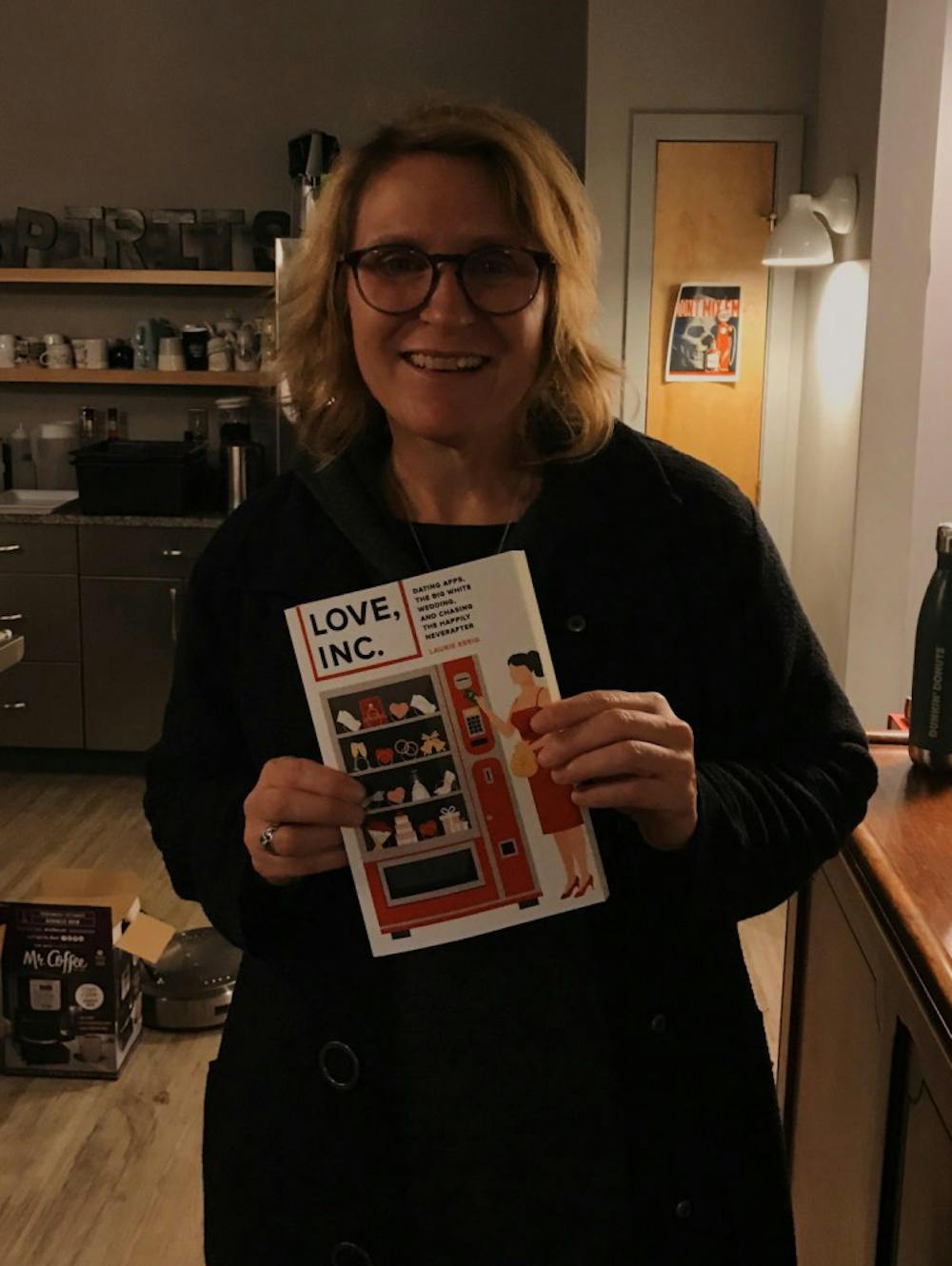“I have a confession: I am a true romantic. I fervently believe in happily ever after and true love always,” Professor Laurie Essig of the Gender, Sexuality, and Feminist Studies (GSFS) Department read to supporters of her newest book, “Love, Inc.”
“I am also a cynic,” Essig said. “I have a sinking feeling that romance blinds us with fairy dust.”
The audience of college students and Vermonters gathered at Stonecutter Spirits on Friday, Oct. 4, for “Love Stinks: 80s Rock Ballads + Laurie Essig’s Love Inc.,” an evening in which Essig deconstructed the “romantic industrial complex.” It seemed fitting that the event was held at a local, female-owned business that also temporarily houses a female-owned vintage pop-up shop called Reel Vintage. Co-hosted by Womensafe and Planned Parenthood NNE, the event sought to envision the feminist future Essig advocates for in “Love, Inc.”
Situated between barrels of gin and whiskey and racks of vintage clothing, Essig imparted her argument to the Blundstone-donned audience: the further capitalism drives the world towards environmental, economic and political chaos, the more society is driven towards the romance industry as a coping mechanism.
She began her argument with a tale of matrimony rendered sensational due to the then-modern technology of the mid-19th century. Queen Victoria’s white wedding was the first of its kind to become popularized by telegraph, a technology that allowed for the beginning of a cultural obsession with white virginal dresses, wedding rings and the tale of happily-ever-afters. Essig fast-forwarded to the 20th century era of Reaganomics (where all roads seem to lead), which was born amidst the global fascination (read: distraction) with Princess Diana and Prince Charles’s elaborate white wedding in 1981.
Instead of critiquing trickle-down economics and consequently engaging in productive civil discourse, as Essig might have preferred, the American public was being sold an idea of romantic bliss only made possible with the purchase of a wedding priced at — on average — $32,641 as of 2016. She notes that we continue to drug ourselves with romantic falsehoods to this day. Deconstructing the “dream[s] about a land of (white) plenty” in bestselling romance novels like “Twilight” and “Fifty Shades of Grey,” Essig argued that these books teach readers to value the attainment of unrealistically wealthy, white, heterosexual lifestyles.

Professor Laurie Essig deconstructed our society’s conventional ideas about romance at an evening at Stonecutter Spirits, a female-owned business.
Essig did not eschew “romantic” connection itself but rather urged the emotional and spiritual connection with another human being to be the foundation for positive change. She encouraged people to focus on this concept of love as opposed to false, purchased marital harmony that distracts us and drains our wallets. When asked by an audience member how to combat capitalism through our romantic lives, Essig jokingly responded,“Canvassing together works really well.”
On a more serious note, however, Essig urged her audience to not mistake her for propagating singleness and apathy as cures to this phenomenon, nor does she believe that wallowing in scientific projections of the climate crisis is a productive use of our time and mental capacity. “A future is possible — that’s the most romantic thing you can think.” Essig encouraged the audience to realize that the romantic future we all desire cannot be achieved just by spending an average of $2,379 on fresh flowers for their wedding celebration.
“I don’t see love or intimacy as a withdrawal from the world, but rather as a way to find someone to confront the hardships of the world with,” audience member Christian Kummer ’22 said.” Kummer pointed out that love — not necessarily even romance — can distract from civic engagement. He referenced obstacles of domestic life like laundry and errands — as reasons people often withdraw from the public sphere and advocated for healthy relationships that foster political action.
Of course, arriving at a place where one can think critically about public narratives and begin to dispel the tales of happily-ever-afters that drench our society is not simple.
One audience member who identified herself as the mother of a preteen attended Essig’s event as an avid opposer to the romance ideology, and said she actively works to counteract the powerful effects of “the Machine” that has made so much of our society numb and oblivious. In her household, her daughter doesn’t have a phone and is not allowed access to television. As a mother, the audience member tries to instill positive body image messages like encouraging her daughter to ask herself “What does [my] body need?” instead of succumbing to the pressures of mass media that sell fairy tales of what bodies look like to impressionable youth and adults alike.
While navigating romantic relationships is ultimately personal and these decisions are different for everyone, Essig stressed that this personal experience is fundamentally political and collective as well. She writes, “in that happy ending we ride off into the future not with our prince or princess to a castle on the hill, but with each other, all of us — married, single, straight, gay, old, young, white and black and Latino/a and more — fighting harder than we have ever fought before for a collective future.”




